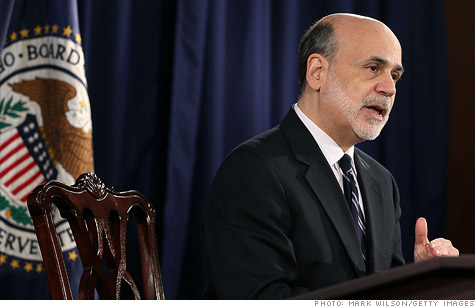Search News

Federal Reserve Chairman Ben Bernanke says the economy is improving, but not quickly enough for the Fed to change its stimulative policies.
NEW YORK (CNNMoney) -- The Federal Reserve believes the economy is improving, but not enough to warrant a change in its stimulative policies just yet.
"The Committee expects economic growth to remain moderate over coming quarters and then to pick up gradually," the Fed's official statement said.
The 17 members of the Federal Open Market Committee revised their economic forecasts Wednesday, predicting the unemployment rate will fall to between 7.8% and 8% by the end of the year.
That's an improvement from what the Fed had previously anticipated, but still not much better than the current 8.2% unemployment rate.
The Fed also sees improvement in overall economic growth, predicting the economy will grow between 2.4% and 2.9% this year, which would be significantly better than 1.7% growth last year.
The longer-term outlook, however, was less rosy. Fed members lowered their forecasts for economic growth in 2013 and 2014, and collectively agreed that the economy will remain weak enough to warrant ultra-low interest rates "at least through late 2014."
The Fed has kept interest rates near zero since December 2008, hoping cheaper access to credit will spur economic growth.
But the forecasts represent a range of views, and not all of the voting members agreed.
Richmond Fed President Jeffrey Lacker dissented against that language, as he did in the last two meetings. He believes the economy will not need ultra-low interest rates as far out as late 2014. All nine of the Fed's other voting members voted in favor of the statement.
Meanwhile, the program known as Operation Twist remains in place, shifting $400 billion from short-term to long-term bonds. The hope is that this program, which is scheduled to end in June, will bring down long-term interest rates on items like car loans and mortgages.
Despite all the Fed's efforts, the economy remains a mixed bag.
The unemployment rate has fallen recently, but so has the number of Americans participating in the job market. In a press conference, Fed Chairman Ben Bernanke acknowledged that the percentage of women participating in the labor market has leveled out, and as society ages, that too leads to a lower participation rate.
The Federal Reserve also noted "strains in global financial markets continue to pose significant downside risks," oil and gasoline prices may push inflation higher temporarily, and the housing market is still struggling.
"Fiscal cliff" also remains a threat, Bernanke said. The ominous term refers to several government changes triggered at the beginning of 2013. The Bush tax cuts, payroll tax cut and extended unemployment benefits are all set to end, at the same time that the government starts slashing defense and discretionary spending.
All those factors combined would pose "significant risk to the recovery" Bernanke said.
"If no action were to be taken by the fiscal authorities, the size of the fiscal cliff is such that, there's absolutely no chance the Federal Reserve could, or would have any ability whatsoever to offset that effect on the economy," he added. ![]()
| Overnight Avg Rate | Latest | Change | Last Week |
|---|---|---|---|
| 30 yr fixed | 3.80% | 3.88% | |
| 15 yr fixed | 3.20% | 3.23% | |
| 5/1 ARM | 3.84% | 3.88% | |
| 30 yr refi | 3.82% | 3.93% | |
| 15 yr refi | 3.20% | 3.23% |
Today's featured rates:
| Latest Report | Next Update |
|---|---|
| Home prices | Aug 28 |
| Consumer confidence | Aug 28 |
| GDP | Aug 29 |
| Manufacturing (ISM) | Sept 4 |
| Jobs | Sept 7 |
| Inflation (CPI) | Sept 14 |
| Retail sales | Sept 14 |